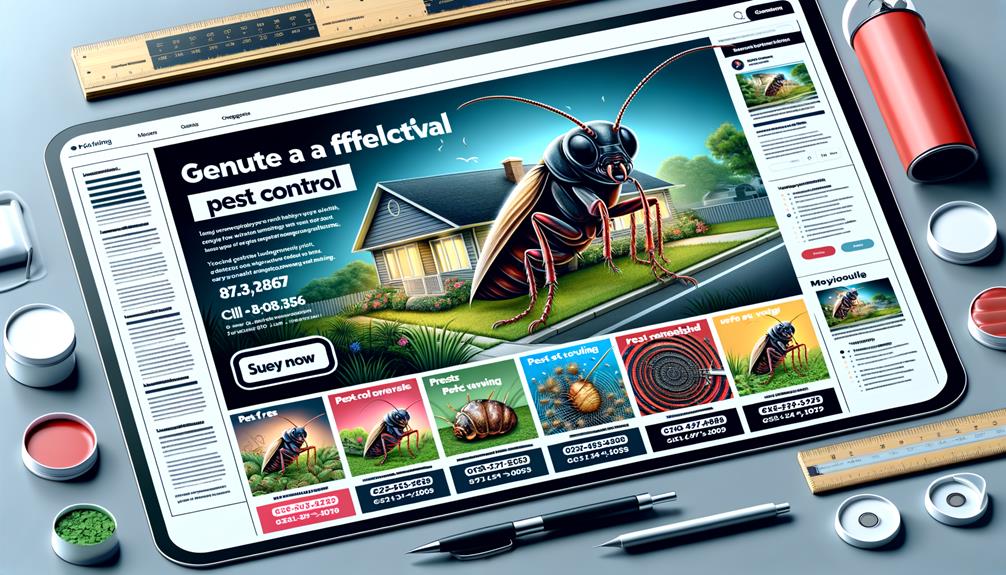You know that feeling when you’re trying to enjoy a peaceful evening at home, but those pesky pests just won’t leave you alone?
Well, when it comes to managing a local pest control PPC campaign, it’s crucial to employ the most effective strategies to ensure that your ads are reaching the right audience at the right time.
Whether you’re a small pest control business or a larger operation, finding the best tactics to maximize your PPC efforts can make a significant difference in your online visibility and customer acquisition.
But where do you begin? Let’s uncover the top 10 strategies that can help you take control of your local pest control PPC game and stay ahead of the competition.
Table of Contents
ToggleKey Takeaways
- Incorporate geo-targeted keywords and localized ad copy to match the search intent of local customers.
- Implement a thorough negative keyword optimization strategy to exclude irrelevant searches.
- Utilize ad extensions such as location extensions, callout extensions, sitelink extensions, and call extensions to enhance visibility and provide relevant details.
- Optimize ads for mobile devices and tailor ad design and messaging to address the specific needs of the local demographic.
Geo-Targeted Keywords
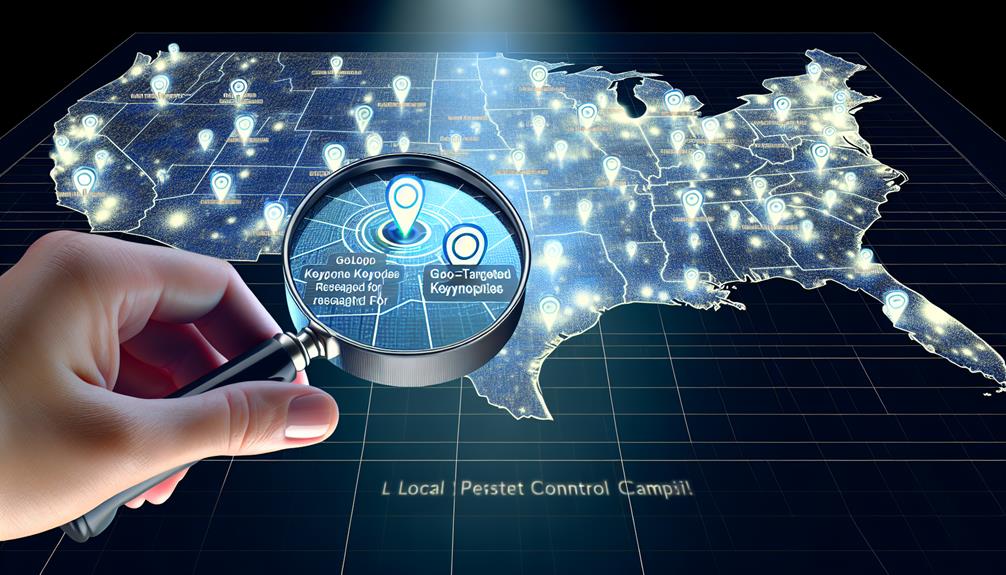
When creating your pest control PPC campaign, incorporating geo-targeted keywords is crucial for reaching potential customers in specific locations. Localized targeting allows you to focus on particular areas where your services are in demand, increasing the relevance of your ads and improving your chances of conversion.
Regional keyword research plays a vital role in identifying the specific terms and phrases that potential customers in different locations are using to search for pest control services. By incorporating these geo-targeted keywords into your PPC campaigns, you can tailor your ads to match the search intent of local customers, resulting in higher click-through rates and more qualified leads.
To effectively implement geo-targeted keywords, start by conducting comprehensive regional keyword research to identify the terms and phrases that are most relevant to each specific location. Utilize tools such as Google Keyword Planner and SEMrush to discover local search trends and popular keywords in your targeted areas. This approach ensures that your pest control PPC campaigns are optimized to reach potential customers in specific locations, ultimately improving the overall performance and effectiveness of your advertising efforts.
Localized Ad Copy
To create effective localized ad copy for your pest control PPC campaigns, utilize location-specific language and tailored messaging to directly address the needs and concerns of potential customers in each targeted area.
When crafting your ad copy, consider the following strategies:
- Local Branding: Incorporate the name of the city or neighborhood into your ad copy to create a sense of local relevance and trust. For example, ‘Trusted Pest Control Services in [City Name]’.
- Community Engagement: Use language that resonates with the local community. Highlight your involvement in local events or partnerships with community organizations to showcase your commitment to the area.
- Address Local Concerns: Tailor your messaging to address specific pest problems that are prevalent in the targeted area. For instance, if a particular neighborhood struggles with rodent infestations, emphasize your expertise in rodent control in the ad copy.
- Localized Call-to-Action: Encourage local action by including specific calls-to-action that are relevant to the targeted area. For instance, ‘Call for a Free Pest Inspection in [City Name] Today!’
Negative Keyword Optimization
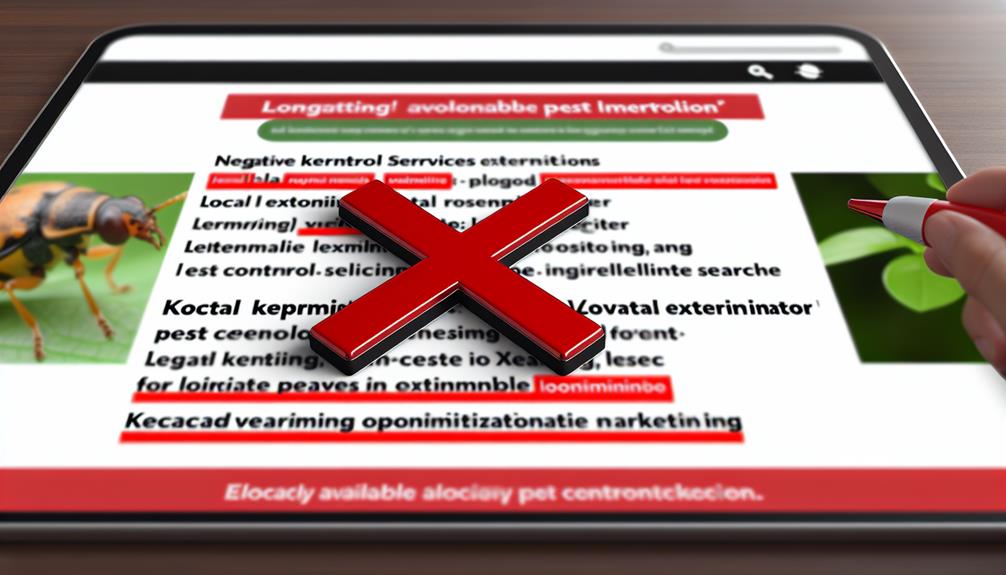
In order to maximize the effectiveness of your localized ad copy and ensure that your pest control PPC campaigns reach the right audience, implementing a thorough negative keyword optimization strategy is crucial.
Negative keyword optimization involves identifying and excluding specific keywords that could trigger your ads to appear in irrelevant searches, ultimately leading to adverse effects on your campaign performance.
By implementing keyword filtering, you can refine your targeting and prevent your ads from showing to users who aren’t actively seeking pest control services in your local area.
To begin, conduct thorough keyword research to identify potential negative keywords. Look for terms that aren’t aligned with your specific pest control services or that may attract irrelevant traffic.
For example, if you specialize in termite control, you may want to exclude keywords related to general home maintenance to ensure that your ads aren’t displayed to users searching for unrelated services.
Additionally, utilize keyword filtering tools provided by PPC platforms to streamline the process of identifying and implementing negative keywords.
Negatively optimizing your keywords can significantly improve the efficiency of your pest control PPC campaigns by reducing wasted ad spend and enhancing the relevance of your ads to potential customers.
Utilizing Ad Extensions
Ad extensions provide additional information and features within your ads, allowing you to enhance their visibility and provide more relevant details to potential customers. When it comes to localized pest control PPC strategies, utilizing ad extensions effectively can significantly improve your campaign’s performance.
Here are some key strategies to optimize ad extensions for your local pest control business:
- Location Extensions: Utilize location extensions to display your business address, making it easier for potential customers to find and visit your physical location.
- Callout Extensions: Highlight specific services or offers such as ’24/7 Emergency Service’ or ‘Family-Friendly Pest Control’ to attract the attention of potential customers.
- Sitelink Extensions: Direct users to specific pages on your website such as ‘Residential Pest Control’ or ‘Commercial Pest Management’ to provide more detailed information directly within the ad.
- Call Extensions: Enable call extensions to display your business phone number, allowing potential customers to contact you directly from the ad.
Mobile-Optimized Ads
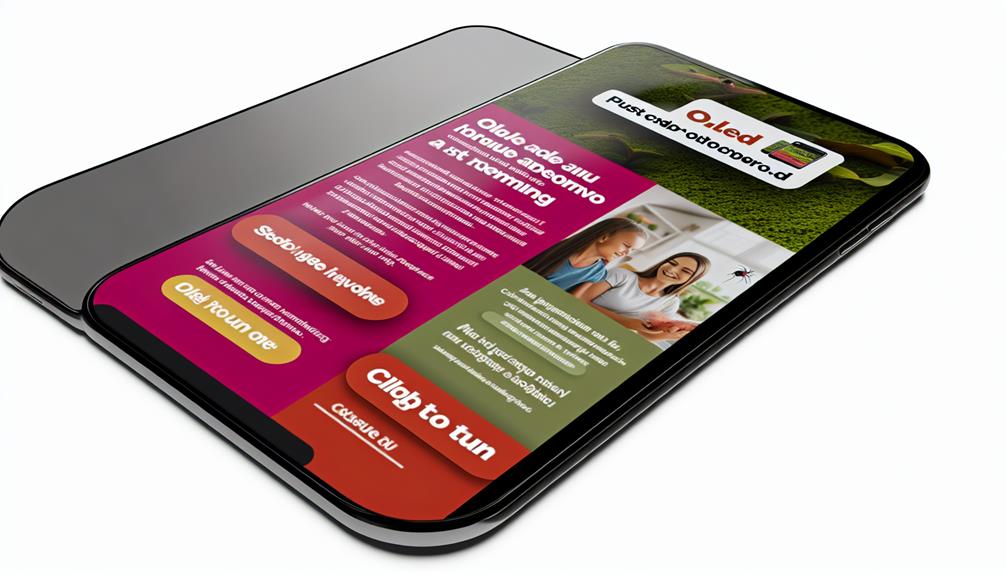
When enhancing your localized pest control PPC strategies, optimizing your ads for mobile devices becomes crucial in reaching potential customers on the go. Ad design is key when creating mobile-optimized ads. Ensure that your ad copy is concise and compelling, with a clear call to action. Use attention-grabbing headlines and include relevant keywords that resonate with local demographics. Mobile users tend to have shorter attention spans, so make sure your ad design is visually appealing and easy to digest on smaller screens.
Consider the specific needs of your local demographic when designing mobile ads. For example, if you’re targeting an area with a high population of families, your ad design could focus on the importance of pest control for a safe and healthy home environment. Understanding the unique characteristics of your local market will allow you to tailor your ad design to resonate with potential customers in your area.
Remember that mobile users are often looking for quick solutions, so ensure that your ad design and messaging address their immediate pest control needs. By optimizing your ads for mobile, you can effectively capture the attention of potential customers while they’re on the move.
Local Landing Pages
When creating local landing pages for your pest control PPC campaign, it’s crucial to target local keywords that reflect the specific areas you serve. Highlighting your local expertise and knowledge of the pest issues in the region helps build trust with potential customers.
Including local contact information, such as a phone number and address, makes it easier for local prospects to reach out to you for assistance.
Target Local Keywords
To effectively target local keywords for your pest control business, creating local landing pages is essential. By incorporating local SEO strategies into your landing pages, you can significantly enhance your online visibility within your community.
Here are some key steps to optimize your local landing pages for pest control PPC:
- Keyword Research: Identify local search terms that potential customers are using to find pest control services in your area.
- Local Content: Create content tailored to your local audience, addressing specific pest issues in your community.
- Geotargeting: Use location-based keywords and meta tags to signal to search engines that your services are relevant to local searches.
- Community Engagement: Encourage customer reviews, testimonials, and local partnerships to build trust and authority within your community.
Highlight Local Expertise
Highlighting your local expertise on your landing pages is crucial for establishing trust and credibility with potential customers seeking pest control services in your area. Demonstrating your local expertise through content that highlights your knowledge of local pest issues, environmental factors, and community involvement can significantly impact your PPC campaign’s success.
Your landing pages should emphasize your team’s understanding of the specific pest control needs within your community, showcasing your experience in addressing local pest challenges. By incorporating local expertise into your landing pages, you can effectively communicate your understanding of the unique pest issues in your area, positioning your business as the go-to pest control experts.
Engaging with the community and showcasing your involvement through your landing pages will further solidify your credibility and trustworthiness among local customers.
Include Local Contact Information
Demonstrating your local expertise through content that highlights your knowledge of local pest issues, environmental factors, and community involvement sets the stage for seamlessly incorporating local contact information into your landing pages for a more personalized and effective approach to connecting with potential customers.
When including local contact information on your landing pages, consider the following:
- Ensure your local business listings are accurate and up to date.
- Display your phone number prominently for easy access.
- Link to your social media profiles to showcase community partnerships.
- Use a map tool to display your physical location for local visibility.
Google My Business Integration
Integrating your pest control business with Google My Business can significantly enhance your online visibility and local customer engagement. By optimizing your Google My Business listing, you can improve your local SEO and increase your chances of appearing in the local pack and Google Maps integration.
Start by claiming and verifying your business on Google My Business. Ensure that all your business information such as address, phone number, and website are accurate and up to date. This will help potential customers find and contact you easily.
Utilize Google My Business posts to share updates, promotions, and events to attract local customers. Encourage your satisfied customers to leave reviews on your Google My Business listing to build trust and credibility. Regularly monitor and respond to reviews to show that you value customer feedback and are actively engaged with your clientele.
Additionally, utilizing Google My Business’s messaging feature can make it easier for potential customers to reach out to you with inquiries.
Local Search Ads
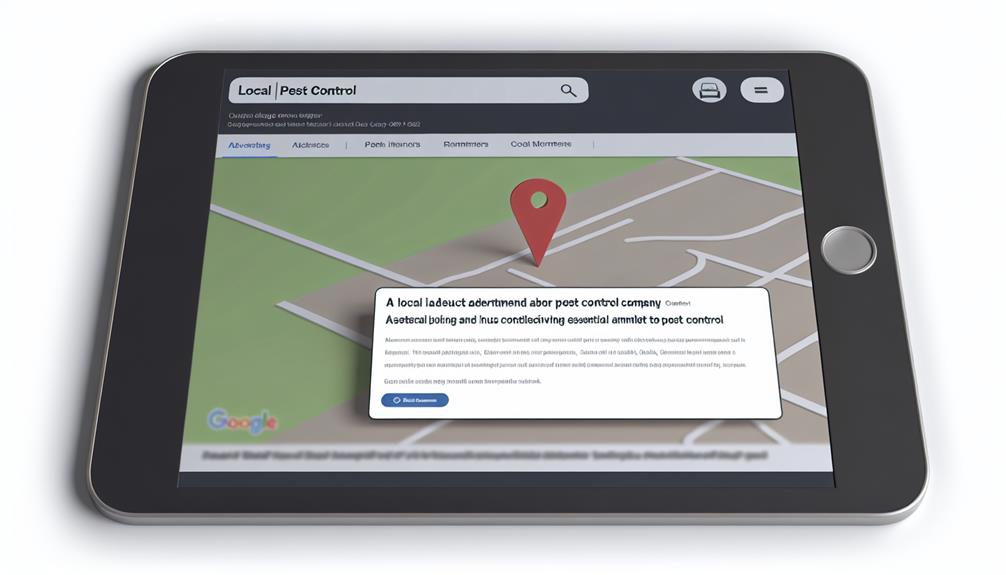
To maximize your local pest control PPC efforts, targeting the local audience with location-specific keywords and geo-targeted ad copy is crucial. By tailoring your ad content to specific geographic areas, you can effectively reach potential customers in your service area.
Utilizing local search ads allows you to connect with nearby prospects who are actively seeking pest control services.
Targeting Local Audience
When targeting a local audience through Local Search Ads, it’s essential to optimize your ad content to resonate with potential customers in the specific geographical area. To effectively reach your local audience, consider implementing the following strategies:
- Local community engagement: Engage with the local community through social media, forums, and community events to build trust and brand awareness.
- Local event sponsorships: Sponsor local events or sports teams to increase brand visibility and demonstrate your commitment to the community.
- Geo-targeted keywords: Use location-specific keywords in your ad content to ensure that your ads are displayed to the right audience in your local area.
- Localized ad extensions: Utilize ad extensions such as location extensions to provide additional information, like your address and phone number, making it easier for potential customers to find and contact you.
Location-specific Keywords
To effectively target your local audience through Local Search Ads, it’s crucial to incorporate location-specific keywords into your ad content. This ensures that your message is reaching the right audience in your specific geographical area.
Utilizing location-based targeting allows you to tailor your ads to specific regions, increasing the relevance of your campaigns. By incorporating neighborhood-specific campaigns, you can further refine your targeting. This ensures that your ads are reaching potential customers in the areas where your pest control services are available.
These location-specific keywords help to optimize your ad campaigns for local searches. This increases the likelihood of attracting customers in need of pest control services within your service area.
Therefore, integrating location-specific keywords into your ad content is essential for maximizing the effectiveness of your Local Search Ads.
Geo-targeted Ad Copy
When crafting geo-targeted ad copy for local search ads, it’s essential to focus on specific neighborhood attributes and pest control needs to resonate with your local audience effectively.
To maximize the impact of your local ad targeting and regional ad customization, consider the following strategies:
- Highlight specific pest issues prevalent in the targeted area.
- Incorporate local landmarks or well-known neighborhood features in the ad copy.
- Use language and terminology that resonates with the local community.
- Include localized offers or promotions to entice local customers.
Online Review Management
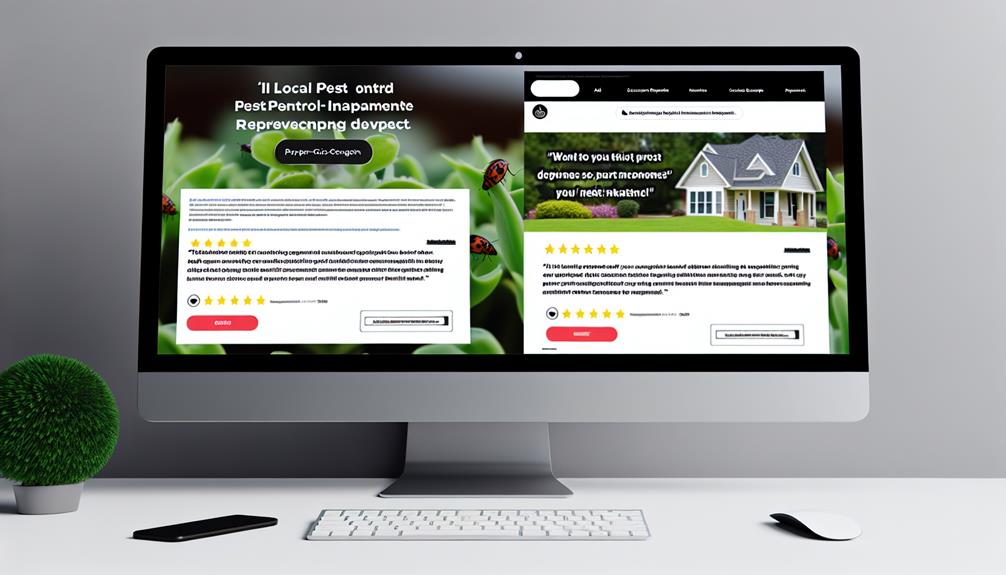
Managing online reviews is essential for maintaining a positive reputation and attracting new customers to your pest control business. Responding to negative reviews is a crucial aspect of online review management. When addressing negative feedback, it’s important to respond promptly and professionally.
Acknowledge the customer’s concerns, apologize for any inconvenience, and offer a resolution. This demonstrates your commitment to customer satisfaction and can help mitigate the impact of a negative review.
Additionally, building an online reputation involves actively encouraging satisfied customers to leave positive reviews. You can do this by sending follow-up emails post-service or providing incentives for feedback.
It’s also important to monitor review platforms regularly and proactively address any issues that arise. By engaging with both positive and negative reviews, you can show potential customers that you’re dedicated to providing exceptional service.
Implementing a comprehensive online review management strategy can significantly enhance your pest control business’s credibility and attract more clients.
Call-Only Campaigns
Consider implementing call-only campaigns in your pest control PPC strategy to drive direct phone calls from potential customers. Call-only campaigns can be an effective way to connect with local customers who prefer to speak directly with a pest control professional.
Here are some key reasons why you should consider integrating call-only campaigns into your PPC strategy:
- Immediate Customer Interaction: Call-only campaigns enable potential customers to connect with your business instantly, increasing the likelihood of converting leads into actual customers.
- Increased Conversion Rates: By directly connecting with potential customers via phone calls, you can guide them through the sales process more effectively, leading to higher conversion rates.
- Call Tracking: Utilize call tracking to monitor and measure the effectiveness of your call-only campaigns, allowing you to optimize your strategy based on actual performance data.
- Local Directories: Ensure that your call-only campaigns are listed in relevant local directories to maximize visibility and reach potential customers in your service area.
Implementing call-only campaigns with features such as call tracking and local directory listings can significantly enhance your pest control PPC strategy by driving quality leads and increasing customer conversions.

